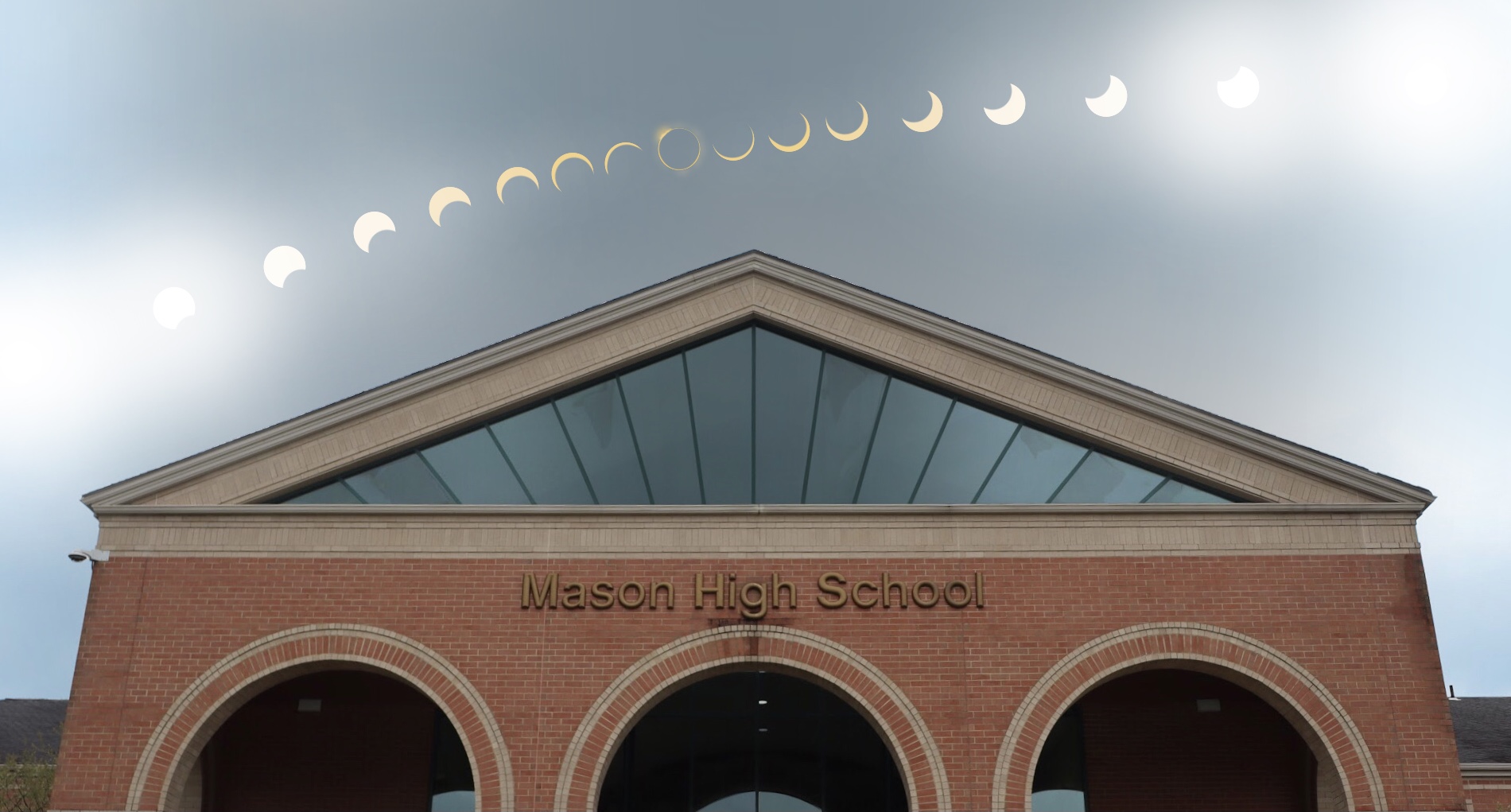Near-total solar eclipse crosses Mason, last for 75 years
Elina Bishoyi | The Chronicle
Mason High School (MHS) students will have the opportunity to view a truly once-in-a-lifetime total solar eclipse this year, with the next one not occurring until 2099.
The solar eclipse on April 8, 2024 will be the first total solar eclipse in Ohio since 1806. The rare phenomenon occurs when the Moon comes between the Sun and the Earth, casting a shadow called the eclipse. The path of totality occurs along the region where the Sun is completely covered by the Moon, resulting in only the outermost ring of the Sun to be visible. This year Mason will be right outside the path of totality.
As a volunteer for the Cincinnati Observatory and a captain for the MHS Science Olympiad team, junior Nikhil Jain said he believes the event is important to view due to the uniqueness of the phenomenon.
“I think it’s important that everybody just goes outside and sees it,” Jain said. “I wouldn’t take it for granted because you never know when you’re gonna get the opportunity to see something like this [for a long time].”

The progression of the Moon’s phases as it moves across the Sun throughout a solar eclipse.
Physics teacher Lora Sheppard said she will be visiting her family’s farm in Greenville, Ohio to view the total solar eclipse. Greenville will be located near the center of the path of totality, resulting in a longer total solar eclipse.
“Eclipses happen all the time, all over the world, but most of the time they’re taking place in the middle of the ocean,” Sheppard said. “It only comes around once every 100 years or so for a total eclipse that people can witness.”
Freshman Angela Tang said she is looking forward to viewing the event due to its rarity and accessibility, especially because much of astronomy is theoretical.
“Since we’re talking about space, there’s not a lot of things you can witness in real life,” Tang said. “But being able to see the solar eclipse is amazing because you can really see it in person.”
As a member of the Mason’s district-wide Solar Eclipse Planning Committee, Sheppard said she has seen students and the community actively preparing to be a part of the event.
“A lot of [students] have questions about the difference between the partial eclipse that they saw in 2017 back in elementary school,” Sheppard said. “This one’s actually a much bigger deal and I’ve noticed the questions and the excitement leading up to it.”
Sheppard said she thinks that the solar eclipse is important to view in-person, and suggests taking full advantage of the unique event.
“The biggest thing I think people should do is be 100% present,” Sheppard said. “It’s not going to look like what it looks like in a picture and there’s plenty of cool professional photographs that are out there. Just watch and take in the moment.”
A competitor on the MHS Science Bowl team in the Earth and Space event, sophomore Ana Gotike said that understanding the science behind a solar eclipse has made her more excited to view the event with her family.
“I think that astronomical events, because of their rarity and because of their significance, are for everybody to enjoy,” Gotike said. “I have looked at lunar eclipses before because those occur a lot more. This [solar eclipse] will be my first one which is really cool.”
Gotike said that her familial connection to the solar eclipse will make the phenomenon memorable for her.
“I remember my dad telling me about the solar eclipse that he saw when he was in India,” Gotike said. “[This solar eclipse] I’m going to go with my little brother and try to get him more into astronomy.”
Tang said she has already seen several people in the community come together to view the event, regardless of their background and personal interests.
“[The eclipse] is making some people curious about the solar system and how stars and planets and moons work,” Tang said. “Astronomy fanatic or not, I think the eclipse will be a once-in-a-lifetime experience for everyone in Mason.”
